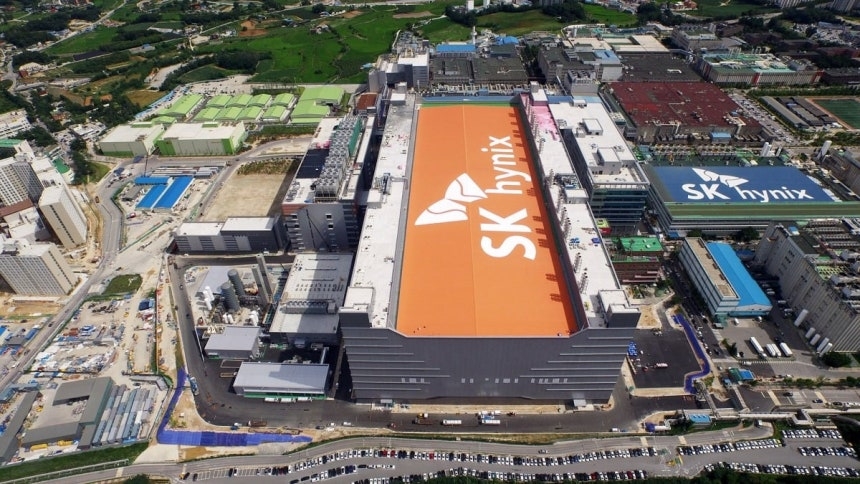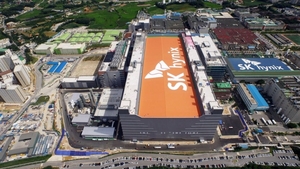Offshore capital sets tone for Kospi, as trading volume, influence eclipse muted domestic voices
 SK hynix’s semiconductor plant in Icheon, Gyeonggi Province (SK hynix)
SK hynix’s semiconductor plant in Icheon, Gyeonggi Province (SK hynix)
South Korea’s leading chipmaker SK hynix saw its stock rally come to an abrupt halt last week following a bearish forecast from global banking giant Goldman Sachs.
The sudden turn underscored the outsized influence of foreign perspectives on the domestic stock market.
On July 17, shares of Kospi-listed SK hynix plunged nearly 9 percent to 269,500 won ($195) as of closing after Goldman Sachs downgraded its investment rating on the memory chip giant to “neutral” from “buy,” citing expectations of a decline in high-bandwidth memory prices amid intensifying competition.
“We believe HBM pricing could decline for the first time in 2026, with increasing competition and pricing power gradually shifting to the major customer, where Hynix has an outsized exposure,” Goldman Sachs analysts wrote.
On the day of the downgrade, foreign investors offloaded SK hynix shares worth 563 billion won, marking a sharp reversal from five consecutive days of net buying. The sell-off sent the stock tumbling, ending its rally just three days after it had surpassed the 300,000 won threshold for the first time on July 14.
This was not the first time SK hynix shares dipped in response to a bearish forecast from a global investment bank. In September last year, Morgan Stanley slashed the chipmaker’s target price by more than half in its “Winter Looms” report, citing weakened demand, which prompted a sharp sell-off.
On the first trading day following the report, SK hynix shares fell as much as 11.12 percent during intraday trading. The bleak outlook also dragged down shares of rival Samsung Electronics, which at the time hit a 52-week intraday low.
These dramatic reactions reflect the heavy foreign ownership of Korea’s top-listed companies. Despite last week’s massive sell-off, foreign investors still held a dominant 55.13 percent stake in SK hynix as of Wednesday, significantly outweighing the roughly 20 percent held by both retail and domestic institutional investors.
Samsung Electronics has a similar ownership pattern, with foreign investors holding a 50.24 percent stake.
The trend extends to many Kospi-listed companies. As of Wednesday, foreign ownership across the Kospi stood at 32.44 percent in terms of market cap, with the figure exceeding 50 percent for several blue-chip stocks.
According to a KB Asset Management report published Tuesday, the average correlation between net daily foreign investor purchases and the Kospi’s daily return over the past 40 trading days stood at 0.54, far outpacing the 0.35 for institutional investors and minus 0.7 for retail investors. A higher correlation coefficient indicates greater influence on the index.
“Foreign investors tend to concentrate on large-cap stocks and display consistent, directional trading behavior, which makes them a dominant force in the Kospi,” the report explained.
The latest downturn stands in stark contrast to the relatively muted reactions typically seen following reports from domestic analysts.
Just days before Goldman’s downgrade, several local brokerages had issued similar warnings that SK hynix’s stock was overvalued. Mirae Asset Securities, for instance, downgraded its investment rating from “buy” to “neutral” on July 14. Yet the stock remained largely stable in the following days, hovering in the upper 290,000 won range.
After Goldman Sachs released its report, institutional investors, who had been net selling between 98 billion and 134 billion won worth of SK hynix shares per day for four straight days, suddenly more than doubled their net sales to 289 billion won.
The disparity highlights the disproportionate sway of foreign analysts and investors over Korea’s stock market, a dynamic partly rooted in domestic brokerages’ reluctance to offer negative assessments.
According to the Korea Capital Market Institute on Monday, just 0.1 percent of analyst reports from Korean firms between 2020 and 2024 recommended a “sell.” In contrast, 92.9 percent were rated “buy,” and 6.8 percent were “neutral.”
“While a bias toward ‘buy’ ratings is common globally, the trend has become especially pronounced in Korea in recent years,” said Kim Joon-seok, a senior research fellow at the think tank.
Market officials point to close business ties between domestic brokerages and the companies they cover as a key reason for the bias.
“For local firms, the companies under analysis are often also clients of their investment banking services,” said an official from a domestic securities firm. “If an analyst issues a negative report, it could trigger internal backlash from the investment banking division, which fears losing the client. As a result, analysts are often reluctant to publish bearish views — even when justified.”
silverstar@heraldcorp.com

